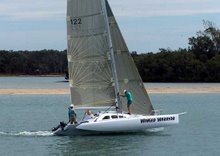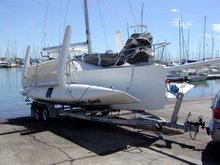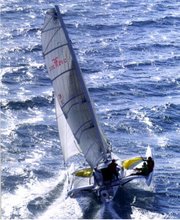Some readers of this blog have asked different questions regarding vacuum and laminate, so in this post I will try to cover these steps of the building.

Starting cutting the different layers. Here the peelply. Once cut, the pieces are put aside for later use. Preparing is rule when vacuumbagging. All materials should be ready once the epoxy work starts. I made this rolling rack to move the diffrent matrials around. From the top you see bleeder fabric, perforated film and 40 + 60 grit sandpaper, peelply, and bottom is glass.

Rolling the bleeder and put aside. What is going on besides this I do not know, Musse seems very exited about this, I look more skeptical.

Preparing the seal at hatch with tacky tape. Glass is ready for

Mixing epoxy by weight.

Musse roll epoxy on the fabric, I use a sqeegee to remove the surplus. It should be like a good hand layup when finish, only vacuum help clamping it together at elephant weight/m2 or something like that. There is no air left at all, all corner are tight, and more epoxy is absorbed by the bleeder fabric so a higher glass/epoxy ratio is achieved.

Peel ply extending past the laminate, which overlap the keel.

The Perforated film. Starring Martin F with friends.

The perforated film 2 . Starring Martin F in absentia.

I here show one sort of vacuum port I got. The two parts are twist-locked together with the bag between them. And the bleeder is put on .

I seal the bag around the hatch. I drilled a 3 mm hole in the shroud bulkhead so air can get into the aft end of the float. If this is not done the float will collapse. On the float is a batten with the vacuum hose attached. It got 4 outtakes. I do not use port for these ( I will maybe by some) I just seal them in the edge of the bag.

The bag is ready

The very smart vacuum coupling, sorry I only got one.

Musse connect the push in ( not up) hose.

The Blue lines are from the old Dupont ( see below) the transperant runs to Dupond.

Vacuum is being drawn.

My old pump, an Edwards from england. Cannot get along with the new so I had to seperate them by a wall, but there is no door so they can hear each other. Very handy if one of them falls asleep. What a story this is????

My new pump, an Edwards from england. Confused, welcome in the club, so I named them Dupont and Dupond. This one then being Dupond. This one got some kind of exhort filter seen on the top. Very happy with the floor marking though.

Unwrapping the cured float. Bag can be seen at the end. Bleeder on the floor.

A look at the laminate close up. It almost look dry but it is loaded with strong juice. Very course fabric I got from my supplier, a roving this is. This is super.

Again a look at the final laminate with additional reinforcement, seen as more green in the middle. This is an extra layer on each side of the float.

Good night everybody.
 I almost used up this pile of scrap, so my waste is almost nil. That is the good thing about this foam, you can join it for details like these bow caps.
I almost used up this pile of scrap, so my waste is almost nil. That is the good thing about this foam, you can join it for details like these bow caps.

 Here the bow is fitted and faired ( bog not sanded yet). I then need to glass it.
Here the bow is fitted and faired ( bog not sanded yet). I then need to glass it.  I also cut the round hatches open a made the holes for beams. Note they are offset a bit aft.
I also cut the round hatches open a made the holes for beams. Note they are offset a bit aft.

































